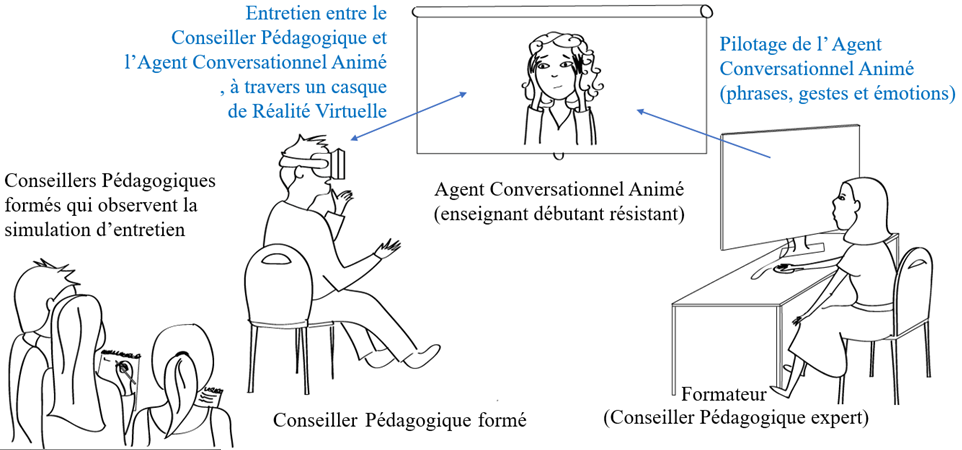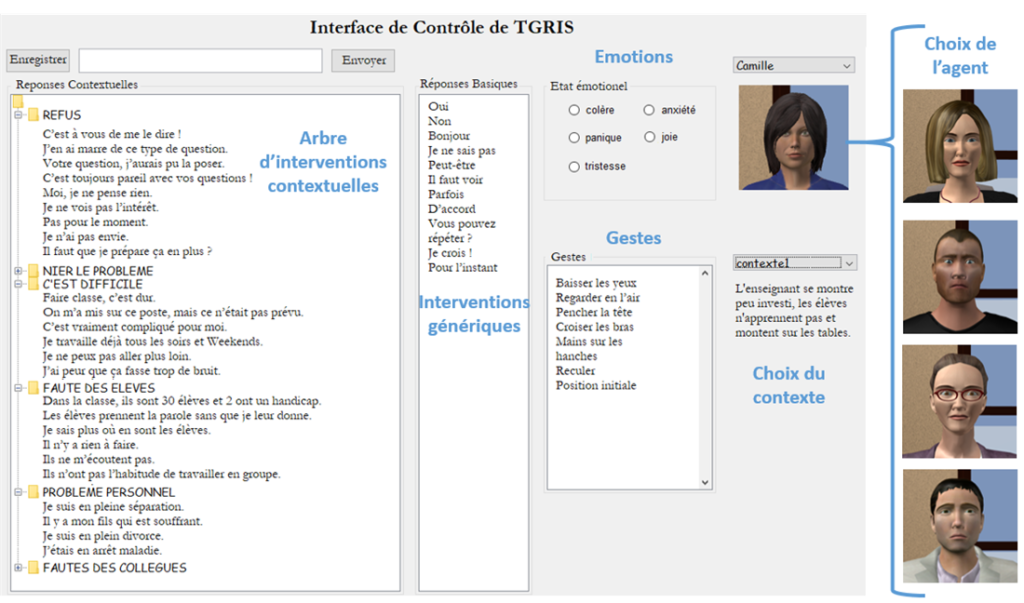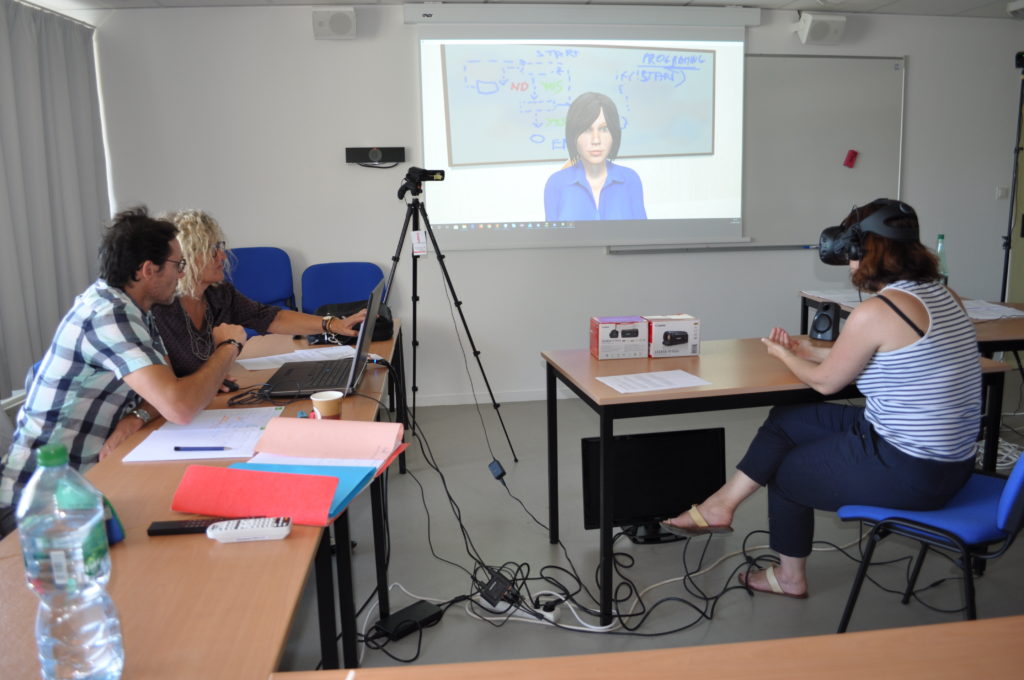Simulation for training on emotions (TGRIS)
Date: 09/2016 - 12/2021
Funding: RFI AltanStic 2020
Call: starter project
Partners: Lab-STICC (France), cren (France)URL: https://lium.univ-lemans.fr/en/tgris/
LIUM Participant(s): |  Iza Marfisi Iza Marfisi |

Date: 09/2016 - 12/2021
Funding: RFI AltanStic 2020
Call: starter project
Partners: Lab-STICC (France), cren (France)URL: https://lium.univ-lemans.fr/en/tgris/
LIUM Participant(s): |  Iza Marfisi Iza Marfisi |
Iza Marfisi – Associate Professor, LIUM <iza.marfisi at univ-lemans.fr>
Isabelle Vinatier – Full Professor, CREN <isabelle.vinatier at univ-nantes.fr >
Elisabetta Bevacqua – Associate Professor, Lab-STICC <bevacqua at enib.fr>
In the context of a pluridisciplinary collaboration between the LIUM (computer science) the CREN (Human and Social Sciences) and an association of pedagogical counselors, we have identified problems related to the fact that emotions are not taken into account in their official training. We try to tackle this problem by developing TGRIS, a Virtual Reality (VR) simulation tool. TGRIS offers natural interactions since the learner speaks directly to the Animated Conversational Agent (ACA), as if it were human. It is the teacher (an expert pedagogical counselor) who triggers the sentences, the movements and the emotions of the ACA in such a way to create conflictual situations that are emotionally intense. In addition, the teachers can set up TGRIS with new sentences and emotions in order to adapt the tool to their pedagogical objectives. In our case, the pedagogical counselors identify several problematic situations that they integrated to TGRIS.
Our first experimentation with 12 Pedagogical Concelors (PCs) shows that TGRIS has great potential for their training. The tool allowed to create engaging situations in which the PCs carried out interviews with virtual novice teachers. The expert PCs, who were training their fellow PCs, naturally simulated resistant novice teachers, in order to destabilize the trainees and promote their analysis of the situation they had just lived. The simulations seemed pertinent because the PCs were truly destabilized by the ACA’s reactions, and especially their resistance to their advice. The simulations were also very emotionally intense, which was not the case during the role-playing sessions they usually use for their training. These emotions were clearly stronger with the VR version of TGRIS. The debriefing sessions, conducted right after the simulations, were particularly rich because of the fact that the PC’s had been destabilized. These sessions allowed the PCs to analyze the emotions they had felt and the real situations they had experiences and remembered thanks to the simulation. Most importantly, the PCs were able to provide a critical analysis of the professional posture.
The trained PC sits on a chair and talks directly to the ACA through a VR headset. Thanks to high performance headphones, he/she is completely cut off from the surroundings. Before starting the simulation, the teacher can choose a face for the ACA and the context of the interview (short introduction of the interview: the novice teacher does not seem invested in her role and the students climb on the tables). The other PCs observe the simulation and take part in the debriefing session right after.

During the simulation, the ACA’s reactions are triggers by the teacher in real time, via the control interface. The teacher can trigger the ACA’s verbal (sentences), non-verbal (e.g. cross arms, move back) responses and change its emotions (e.g. angry, anxious, sad). By default, the interface offers a set of generic sentences (e.g. yes, no, I don’t’ know) that can be used for any type of interview. TGRIS also allows the teachers to add their own reactions, specific to the situations they want to recreate and their pedagogical objectives. In our case, the PC’s selected a list of the problematic responses that can occur when starting a counseling session with novice teachers.

These sentences were grouped into six categories, represented in a tree. For example, the category refusal contains sentences such as “I’ve had enough of this type of question” or “You should tell me”. Some of these categories are associated to an emotion (anger for the refusal category). The teacher can either open the category and choose one of the sentences, or click on the category to trigger a random sentence. The teachers can also add their reactions (sentences, categories and associated emotions) in a text document but they can also add new sentences directly on the control interface. Complete list of the ACA’s interventions in French : Réactions de l’ACA dans TGRIS.
TGRIS is built on the GRETA ACA platform. This platform has the specificity of offering a wide range of multi-modal emotions, combining the sound of the voice, facial expressions and body language. In addition, GRETA’s agents react to the sound of the voice by nodding their head and changing the direction of their gaze, hence giving the impression that they are listening.

TGRIS is now integrated in the profession training course of the Pedagogical Counselors in the Nantes region (France).
We are looking for other contexts in with to text the simulation tool. If you are interested, do not hesitate to contact us.

